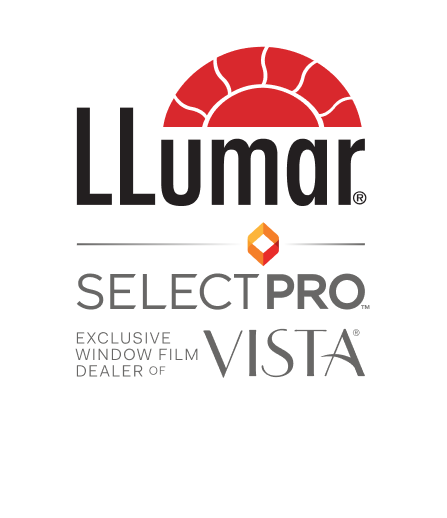Understanding UV filtering and & Solar Control Window Film
UV filtering and solar control window film, often referred to as window tinting, serve various purposes in both residential and commercial settings. These films are designed to address a range of concerns, such as reducing heat, blocking harmful UV rays, enhancing privacy, and providing security. Commercial window tinting and residential window tinting have become popular options for property owners looking to improve energy efficiency, comfort, and aesthetics.
Heat control window film is an essential component of solar control films. By applying heat-blocking window film to your windows, you can significantly reduce the amount of heat that enters your space. This not only helps maintain a comfortable indoor temperature but also lowers energy consumption, thus reducing utility bills. It is particularly valuable in hot climates where air conditioning costs can be a significant expense.
Solar film for home windows is more than just a practical solution for heat control. Many modern films also come in decorative options. Decorative window films offer both aesthetic appeal and functional benefits. They come in a variety of patterns, colors, and designs, allowing homeowners to customize their spaces while enjoying the benefits of solar control and privacy. These decorative window films transform ordinary windows into works of art, adding character to residential spaces.
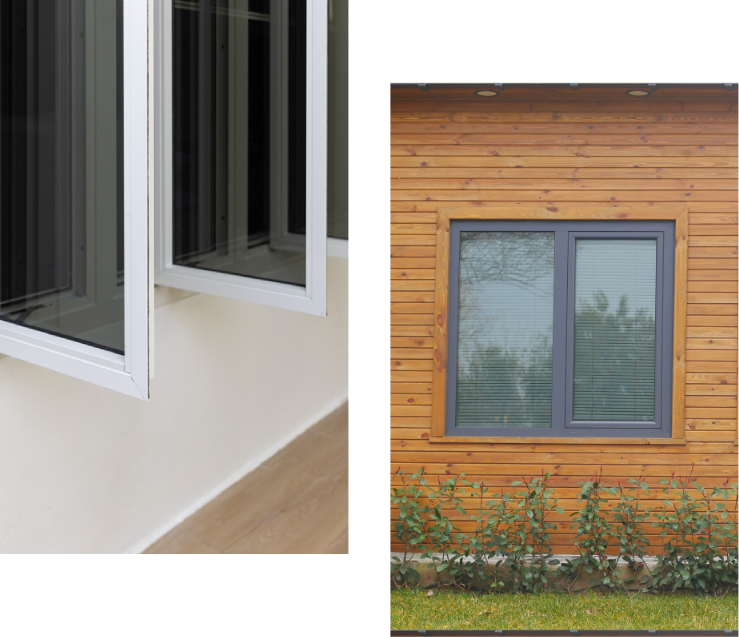
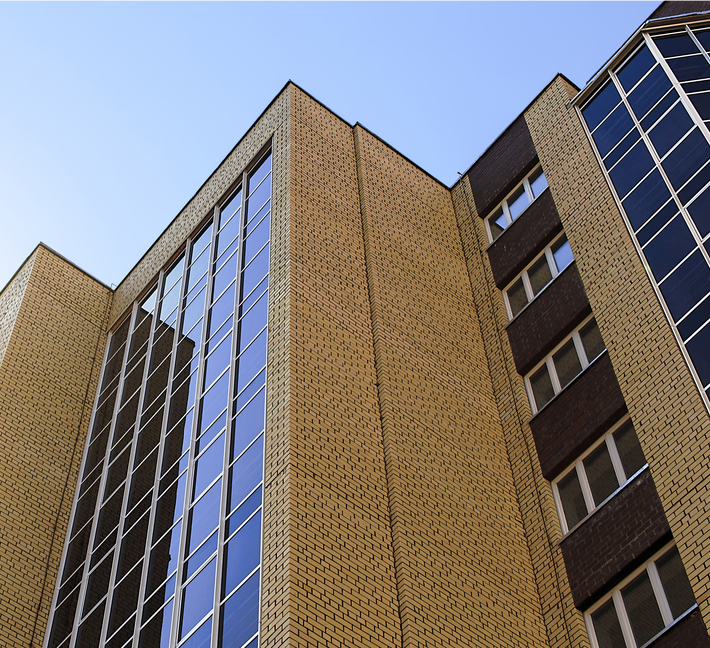
Interior vs Exterior Applied Window Film
On the other hand, exterior surface installation, while less common, is preferred in some situations. This approach is advantageous for commercial window tinting and anti-graffiti film for glass, as it offers better protection against vandalism and damage. When anti-graffiti film is applied to the exterior, it can act as a sacrificial layer, shielding the glass from graffiti and other forms of defacement. However, exterior films are exposed to the elements, which may affect their longevity, making them less suitable for residential settings or places with extreme weather conditions.
In conclusion, the choice between installing window film on the interior or exterior side of the glass depends on your specific needs and goals. Interior installations, such as heat control window film and solar film for home windows, offer better longevity, ease of maintenance, and light control, making them ideal for residential settings. Meanwhile, exterior installations, such as anti-graffiti film for glass, are better suited for commercial environments that require enhanced protection against vandalism and damage. Carefully consider your priorities when selecting the right window tinting method for your unique circumstances.
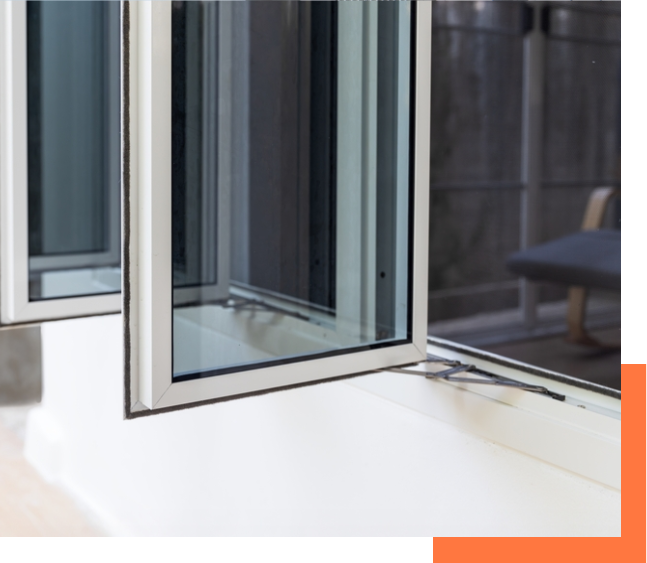
Thinking about installing Solar Film?
The decision to have solar film installed in your home or commercial space involves a thoughtful process that considers various factors, with durability and cost being at the forefront. Durability plays a significant role in this decision. Home and business owners want to ensure that their investment in solar film will provide long-term benefits. Quality solar films are engineered to withstand harsh environmental conditions and UV exposure, ensuring they remain effective for years to come. The peace of mind that comes with knowing your solar film will stand the test of time is a key consideration.
Cost is another vital factor in the decision-making process. While solar film offers significant energy savings, its upfront cost is an important consideration. Homeowners and business operators must weigh the initial investment against the long-term savings on energy bills. Professional installation is crucial to maximize the effectiveness and longevity of the solar film. Hiring skilled technicians ensures that the film is applied correctly and securely, minimizing the risk of peeling, bubbling, or other issues that could compromise its performance. Professional installation also often comes with warranties that provide added protection for your investment, making it a wise choice for both residential and commercial spaces.
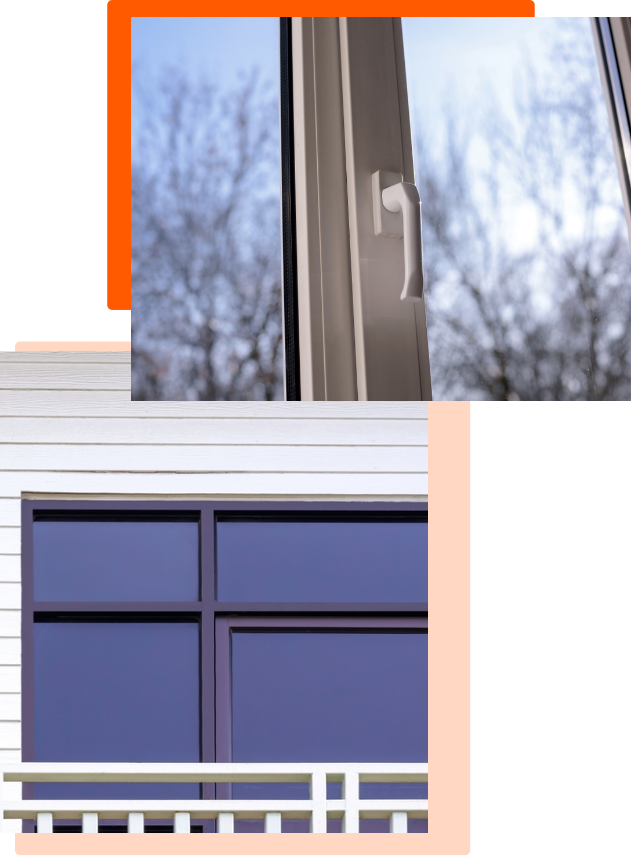
Clear UV Blocking Film vs. Tinted Film
Clear UV filtering film is a protective window film designed to shield the interior of a space from the damaging effects of ultraviolet (UV) radiation while maintaining the natural appearance of the glass. This film contains special additives that block a significant portion of the UV rays without affecting the transparency of the window. Its primary function is to reduce fading and degradation of interior items such as furniture, artwork, flooring, and textiles. By applying clear UV filtering film to your windows, you can significantly extend the life and vibrancy of these items.
In addition to clear UV filtering film, tinted films offer an extra layer of protection against fading and degradation. Tinted films have the added benefit of increasing heat rejection, thereby reducing the amount of solar heat that enters a space. The combination of UV protection and enhanced heat rejection provides even greater fade protection. As solar radiation generates heat, it can accelerate the fading process. Tinted films work to minimize this by blocking a portion of the sun's heat. By reducing the amount of heat that enters your space, tinted films help maintain a more stable and comfortable indoor environment while further safeguarding your interior items from fading and degradation.
The synergy between clear UV filtering film and tinted films demonstrates how an effective strategy can be implemented to maximize the protection of your interior items. These films create a formidable barrier against the harmful effects of UV rays and solar heat, ensuring your valuable possessions remain vibrant and intact for a more extended period. Whether you're looking to preserve the beauty of your home or protect valuable items in a commercial setting, this approach offers a practical solution that balances protection and aesthetic appeal.
What Causes Fading?
Fading of furniture, carpets, and artwork, is caused by a number of factors, including:
Facts about fading
What causes fading?
“As a rule of thumb”
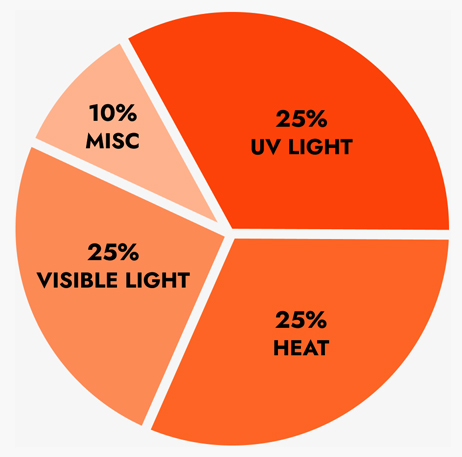
*Miscellaneous = Indoor artificial lighting humidity, and poor dye anchorage
Ultraviolet: (UV) radiation contributes 40% to overall fading and is the primary cause of fading behind glass. UV rays can penetrate glass and break down the chemical bonds in dyes and pigments, causing them to fade or change color.
Visible light: contributes 25%: Even visible light can cause fading over time, although to a lesser extent than UV radiation.
Heat: contributes 25% High temperatures, such as those caused by direct sunlight, can accelerate the chemical reactions that cause fading.
Humidity: High levels of humidity can cause some materials to absorb moisture, which can accelerate the chemical reactions that cause fading.
Pollution: Air pollution and other contaminants in the air can also contribute to fading, particularly if they contain chemicals that can react with the materials behind the glass.
Proximity to the glass: Items that are in direct contact with the glass, such as curtains or blinds, may be more susceptible to fading than those that are set back from the glass.
To prevent fading behind glass, it is recommended to use window films or other window treatments that filter UV radiation and limit the amount of heat and light that enters the building. Additionally, it may be helpful to rotate or move items periodically to minimize their exposure to direct sunlight and other factors that can cause fading. The best Vista window film blocks 99.9% of harmful UV rays before they invade your home or business.
Myths About Solar Control And UV Filtering Films
Myths surrounding solar control and UV filtering films are prevalent and can often lead to misconceptions about the benefits and effectiveness of these window treatments. One common myth is that these films make indoor spaces excessively dark. In reality, modern solar control and UV filtering films are designed to allow natural light to penetrate while reducing glare and heat. They strike a balance between blocking undesirable solar elements and maintaining a well-lit interior, making indoor spaces more comfortable and energy-efficient.
Another misconception is that these films need frequent replacement. High-quality solar control and UV filtering films are durable and long-lasting, typically designed to withstand the elements and maintain their effectiveness for many years. Routine maintenance and cleaning can further extend their lifespan, making them a cost-effective solution for both residential and commercial spaces.
In recent years, window film technologies have seen significant advancements, thanks to the integration of nanotechnology. Nanotechnology-enabled window films are engineered at the molecular level to provide unprecedented benefits. These films can offer superior heat rejection, UV protection, and glare reduction while maintaining optical clarity. By leveraging nanotechnology, these window films achieve remarkable performance levels, providing both residential and commercial spaces with increased energy efficiency and comfort.
One exciting innovation is the development of photochromic window film. This technology enables window films to adapt to changing light conditions. Similar to photochromic eyeglasses, these films darken when exposed to sunlight and lighten in lower light conditions, effectively controlling the amount of natural light and heat that enters a space. This dynamic response enhances comfort and energy efficiency by reducing the need for artificial lighting and air conditioning. Photochromic window films are a game-changer in the realm of smart window tinting and are gaining traction in both commercial and residential settings.
Sputtered and ceramic films are also recent advancements that provide improved performance. Sputtered films are created through a high-tech vacuum deposition process, allowing for precise control over the film's properties. Ceramic films, on the other hand, use advanced ceramic nanoparticles to achieve superior heat rejection and UV protection without compromising visibility. These technologies have become favorites for those seeking a balance between high energy efficiency and optical clarity. Whether you're looking for window tinting for privacy at night, smart tint, or commercial and residential window tinting solutions, these innovative technologies offer superior performance and aesthetics.
Fading of furniture, art, and hardwood flooring is primarily caused by the detrimental effects of solar radiation, specifically ultraviolet (UV) rays, visible light, and heat. Over time, exposure to these elements can result in irreversible damage and discoloration. UV rays are particularly harmful, as they break down the chemical bonds in pigments and dyes found in fabrics, paintings, and wood finishes, leading to fading. Additionally, the heat generated by solar radiation can cause materials to expand and contract, contributing to cracks, warping, and overall deterioration.
Solar film, including both commercial window tint and residential window tint options, is an effective solution to combat these issues. Heat control window film and heat-blocking window film are designed to reduce the amount of solar heat that enters a space, thereby mitigating the temperature fluctuations that can lead to damage and fading. By rejecting a significant portion of solar heat, these films help maintain a stable indoor climate, protecting your furniture, art, and hardwood from the adverse effects of heat exposure.
Moreover, solar film provides a crucial shield against UV rays, which is especially valuable in preserving the integrity of colors and finishes. Light-blocking window film, a subset of solar film, enhances protection by minimizing the entry of visible light. Whether you're seeking window film for heat reduction, energy efficiency, or fade protection, solar film offers a multifaceted solution that safeguards the beauty and longevity of your interior furnishing.
Solar film, when viewed in terms of energy savings, fade control, and skin protection, is indeed worth the cost. The initial investment in high-quality solar film pays off significantly over time by reducing energy consumption. By blocking a considerable amount of solar heat, these films keep indoor spaces cooler during hot seasons, alleviating the strain on air conditioning systems and leading to substantial energy cost savings. This results in a more comfortable environment while lowering utility bills and lessening your carbon footprint, making solar film a practical and eco-friendly choice.
Additionally, solar film serves as a formidable barrier against the damaging effects of UV rays. These rays can cause furniture, flooring, artwork, and other interior items to fade and deteriorate over time. By applying solar film, you're essentially creating a protective shield that helps preserve the vibrancy and longevity of your investments. This not only reduces the need for frequent replacements but also maintains the aesthetic appeal of your interior.
Furthermore, solar film provides essential skin protection. Prolonged exposure to UV rays can have adverse effects on your skin, increasing the risk of skin damage and even skin cancer. Solar film effectively blocks a significant portion of these harmful rays, ensuring a safer and healthier indoor environment. When you consider the combined benefits of energy savings, fade control, and skin protection, the cost of solar film is a wise investment that pays dividends in terms of comfort, longevity, and well-being.
Overall, solar film is a worthwhile investment for the majority looking to protect their families, furnishings, reduce energy costs, and improve comfort and aesthetics when weighing the cost of the film against the benefits budget.
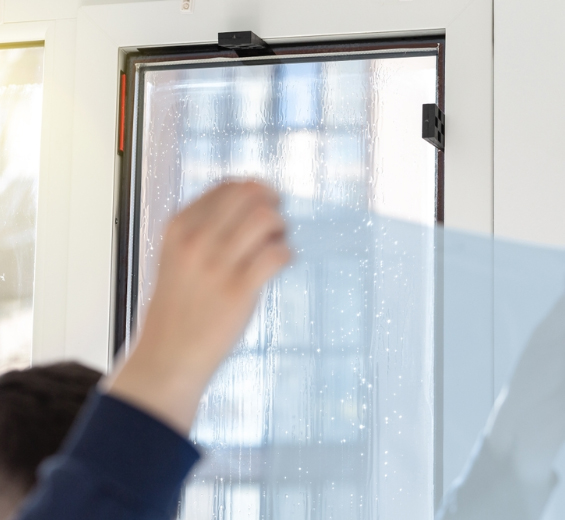
If You Are Ready To Get A Quick Quote Or Just Find Out More About Solar Window Film, Security Film Or Decorative Film, from Atlantic Sun Control, Today!
